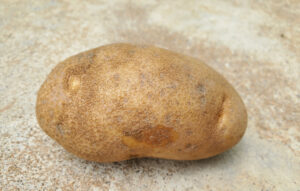 Aug 31, 2022–A few weeks ago I wrote about being a cow. As in a non-thinking animal mindlessly regurgitating other people’s views.
Aug 31, 2022–A few weeks ago I wrote about being a cow. As in a non-thinking animal mindlessly regurgitating other people’s views.
This week I want you to imagine yourself as a potato.
Scott Adams, Dilbert creator, original thinker, and hypnotist, proposed this thought experiment as a way to defeat your ego. Not to get all philosophical, but ego is the source of most stress, worry, and anxiety.
His thought experiment was to imagine two scenarios:
One, you are asked to deliver a potato to a place two blocks away.
Odds are, you shrug, take the potato, and carry it off, with no hesitation or anxiety. You do not worry about dropping it, losing it, getting distracted, or any other of thousands of possibilities that might prevent you from accomplishing your errand. Hey, it’s only a potato.
Now someone asks you to deliver a priceless Picasso work of art over those same two blocks. Suddenly, the stakes soar. The consequences of failure, although the possibilities are exactly the same as for the potato, rise to debilitating proportions. What if the wind catches it, a bird soils it, dirt gets on it, the recipient isn’t there, and on and on. Chances are, you become a nervous mess.
The scenario is a metaphor for how, when we involve our ego, we increase our anxiety.
One way to overcome ego is this: Imagine everything in your environment–physical objects, natural objects, people, this newspaper–is virtual. The world is a computer simulation with artificially-generated objects. Nothing is real.
Now sit back and assess how this makes you feel. For most people, imagining the world as “unreal” turns Picassos into potatoes. If everything is not real, nothing matters. If nothing matters, why worry about it?
Of course this doesn’t give you permission to walk off a cliff, or to push someone else off a cliff. It’s a thought experiment, not a recipe for turning into a sociopath. I would guess many of you have used this method at times of high stress in your own life. For example, when taking a final in college, I would trick my brain into believing it was just another board game, that I was going to have fun playing and not worry who won.
Or when doing a presentation before an important prospect, I reminded myself the only two possible outcomes were 1) no change in my current status, or 2) I would have a new client. If I walked out without winning the account, I was no worse off than before I went in.
I’ve used this approach a lot lately, with the rise in costs and economic uncertainty. We invest a lot of energy into our relationship with money, which becomes the number one source of worry to most people.
As we obsess over prices, I prefer to imagine that money is not real. Our money is simply a convenient way to keep track of how much value we each create as individuals for our society. Back when we were grunting and beating each other with clubs, I would trade you one yak in exchange for you painting my cave. But you might not need a yak when I need my cave painted. So we invented money. I sell my yak to Zak who gives me a pile of green paper, which I then transfer to you. The inherent value of the pile of paper we exchange becomes irrelevant. It could be kumquats. Or potatoes.
I find this world view as incredibly freeing. Rather than worrying about currency exchange rates, all you need to concentrate on is how can you create the most value for society, whether in goods or services, yaks or Picassos. Then let society assign the number of potatoes that is worth.
As for my value to society, please don’t judge by this column.